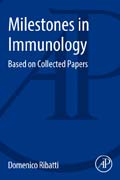
The science of immunology grew from the common knowledge that those who survived many of the common infectious diseases rarely contracted that disease again. Immunology as a distinctive subject developed in the middle of the twentieth century as researchers started to understand how the adaptive immune system aids in defence against pathogens. Since that time it has grown in importance at a steadily increasing rate and has become diversified into special fields such as immunohistochemistry, immunogenetics, and immunopathology. For the past century, immunology has fascinated and inspired some of the greatest scientists of our time and numerous Nobel Prizes have been awarded for fundamental discoveries in immunology, from Paul Ehrlich' work on antibodies (1908) to the studies of Zinkernagel and Doherty (1986) elucidating mechanisms of cell-mediated immunity. The history of Immunology, Based on Collected Papers contains a set of completely updated collected papers concerning immunology and drives us through scientific milestones in the history of medicine in the course of the past two centuries and highlights the contribution of pioneering scientists whose discoveries have paved the way to many researchers working in the field of immunology. Provides on update on the developments since the publications of Nobel prize winning research for fundamental discoveries in immunologyDiscusses the changing theories and technologies that guided the fieldLists all the important discoveries and books in the fieldExplains in detail the many Nobel prize-winning contributions of immunologistsProvides recognition of the scientists who were pioneers of some landmark discoveries in immunology and the corresponding description of their studies that is usually absent or fragmentary in other books INDICE: 1. Paul Ehrlich's doctoral thesis: a milestone in the study of mast cells 2. Miller'seminal studies on the role of thymus in immunity The contribution of Bruce Glick to the definition of the role played by the bursa of Fabricius in the development of the B cell lineage The fundamental contribution of Robert A. Good to the discovery of the crucial role of thymus in mammalian immunity Giulio Bizzozero and the discovery of platelets Sir Frank Macfarlane Burnet and the clonal selection theory of antibody formation The embryonic origins of lymphatic vessels: an historical review The fundamental contribution of William Bate Hardy to shape the concept of mast cell heterogeneity The mast cell: an evolutionary perspective From the discovery of monoclonal antibodies to their therapeutic application: an historical reappraisal Max D. Cooper and the delineation of two lymphoid lienages in the adaptive immune system Edelman's view on the discovery of antibodies Peter Brain Medawar and the discovery of acquired immunological tolerance The discovery of blood-thymus barrier
- ISBN: 978-0-12-811313-4
- Editorial: Academic Press
- Encuadernacion: Rústica
- Páginas: 150
- Fecha Publicación: 01/11/2017
- Nº Volúmenes: 1
- Idioma: Inglés
